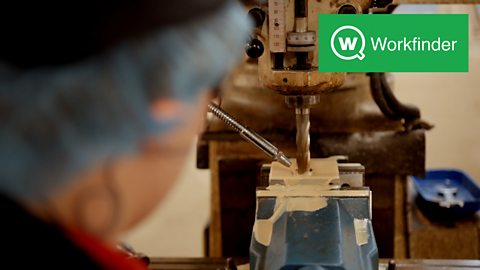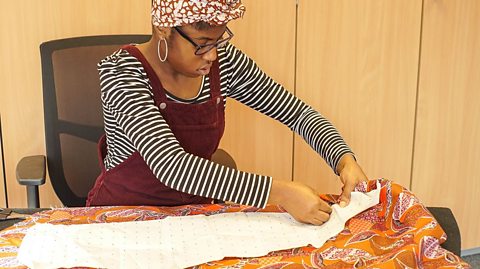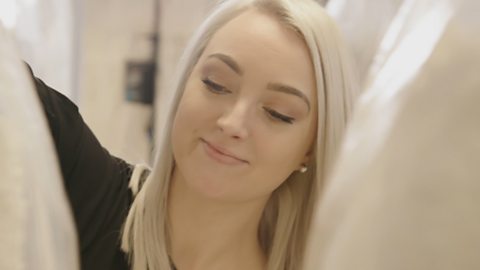Meet Terri, 23, from the Shetlands, to find out more about life as a knitwear designer. Part of our Bitesize world of work series.
Terri:
I'm Terri, I'm 23 years old, and I'm a knitwear designer.
I've always been a knitter. I learnt to knit in primary school. We had knitting classes every week, just the same as we had Music or P.E. My family have been knitting for years and years. We can trace it back to about the 1700 to 1800s. My grandmother has a knitwear business of her own. I could practise things with her and, as my business has grown, I've moved into my own space.
I got my knitting machine from our local college. They were getting rid of several broken machines so I put the pieces together and got a machine that worked. Once my machine was up and running, I just couldn't stop. I ended up leaving my full-time job and started my business and it's been just great since then. I specialise in Shetland wool. So we have a special kind of sheep here called a Shetland sheep and it produces a very specific type of wool, which is very warm, it's waterproof, and it's ideal for making jumpers.
In my business, I make a variety of different products. I make jumpers and headbands on the knitting machine and, by hand, I make hats and gloves as they're a bit more fiddly. Knitting a jumper is a step-by-step process. First, I need to choose my patterns and shapes and then the colours to go with them. I'll go to the shop and get any yarn that I need and, from there, I can start to make the different panels. Then I have people who help me to sew it all together. I then check over the whole garment and I wash it. Then I put it on a jumper board to help stretch it into shape. Then it just needs a Terri Laura label inside of it and it can be posted to the customer.
When I was at school, I really didn't know what I wanted to do and I thought that I wanted to have a different job for every day of the week, and my work now really feels like that. It's so varied and I get to be creative. I would just really like to see where my business takes me because, at the moment, it feels like it could be anywhere.
I’ve always loved knitting – my ancestors have been doing it for generations.
- Terri lives on the Shetland Islands and comes from a long line of knitters and craftspeople
- She sources and colours the wool for her designs herself and sells them on her website
- Terri's grandmother taught her how to knit and owns her own knitwear shop!



A role similar to Terri's is a textile designer. You can learn more about this role on the National Careers Service website. Scroll down for information about what to expect if you'd like to run your own business like Terri.
What to expect if you want to be a business owner
The salary and working hours when you own a business can vary enormously but what's most important is that you work hard and love what you do.
Working for yourself looks different for each person and each business, but in general it means you:
- run your own business and are responsible for its success
- can decide how, when and where you do your work
- charge an agreed, fixed price for your work
- sell goods or services to make a profit
- can hire people at your own expense to help you or to do the work for you.
You can be both employed and self-employed at the same time. You can work for your employer during the day, for example, and run your own business in the evenings and at weekends. It’s important to contact HMRC for advice if you’re not sure if you’re self-employed.
You can get help with setting up or developing your business, through the government’s business support services, for example, for advice about tax or about how to find funding to start your business.
This information is a guide (source: GOV.UK).
For careers advice in all parts of the UK visit: National Careers Service (England), nidirect (Northern Ireland), My World of Work (Scotland) and Careers Wales (Wales).


Work experience in your area
Find work experience placements with Workfinder.
Tips and advice
Help with interviews, writing a CV and all things work experience related.


Careers in hospitality and retail. collection
Find out what you could expect from a role in the hospitality and retail sectors.

Gemma: fashion designer
Gemma designs and makes clothes and has launched her own brand.

Deborah: wedding dress designer and shop owner. video
Deborah's time working part-time in a bridal shop inspired her to open her own wedding dress business.
